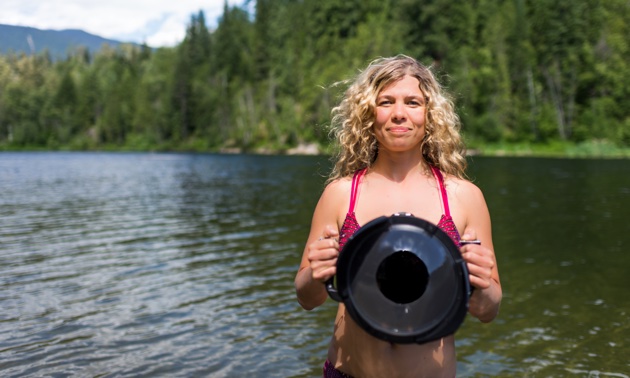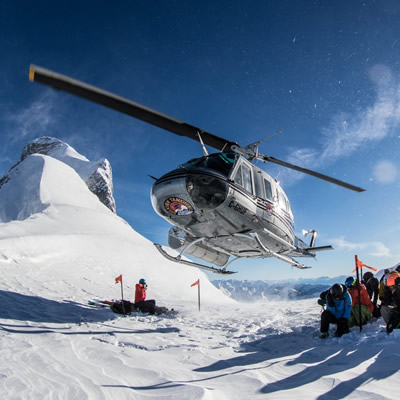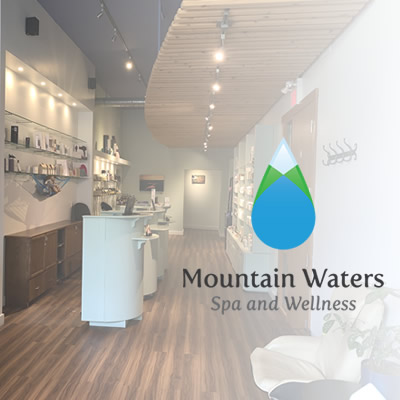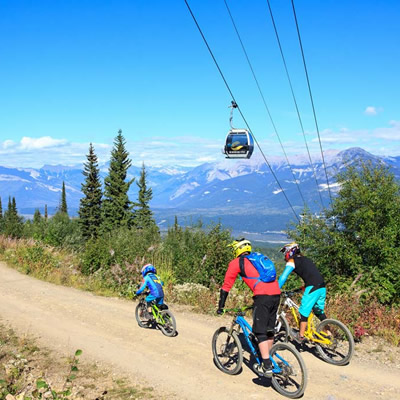Agathe Bernard aims high with new scientific inquiry

Agathe Bernard is training with her underwater camera. — Photo courtesy Agathe Bernard
A former employee of Cranbrook-based TerraLogic Exploration Inc. is hoping to make a positive difference on a large scale through a new scientific inquiry. Agathe Bernard, a passionate earth scientist, outdoor enthusiast and photographer/filmmaker, currently is in the planning and financing stage of a scientific expedition to sail across the Atlantic Ocean from Africa’s Ivory Coast to Brazil. Thirteen other women will be on the crew, each with her own role in the inquiry. The purpose of the trip will be to collect a focused data set on the growing problem of plastics proliferating throughout our Earth’s oceans.
“The end goal of this study," said Bernard, “is to make people aware of how plastic enters the food chain through fish, which understandably mistake our garbage for something to be consumed, given that there is 10 times more plastic in the Atlantic Ocean than there is actual food.”
The team will conduct research to shed light on ways in which plastics negatively impact our environment and our health, and the findings will be used to seek change in the politics and policies governing the way we use plastics in everyone’s daily lives. For Bernard, her role will be to “produce a documentary film of the expedition, in addition to taking water samples for study and research.”
As one might expect, such an undertaking requires many hours of planning and co-ordination between a varied group of participants, and it also takes money. Scientists will be the first to say that obtaining financing for any type of scientific inquiry, no matter how large or small, is never an easy task. Despite this, the organizing team of the expedition, aptly named ‘eXXpedition 2015,’ is looking to raise the required money through a Kickstarter campaign for the month of June. The goal for the campaign is to raise $25,000.
We asked Bernard, who hails from Revelstoke, a few questions about her planned expedition.
Where did the idea for eXXpedition 2015 come from?
The idea for me to embark on this journey began when I went surfing in Indonesia and had to physically battle the plastic garbage floating in the water. I knew plastic in the ocean was an issue but I truly measured the scale of the problem during this trip.
Why is this issue important to you?
My background is in geology, so I am able to look at this issue through a scientific lens and can quantifiably measure how our love affair with plastic products is affecting the oceans that cover over 70 per cent of the planet we call home. My passion for outdoor adventure and exploration has also put me face-to-face with the devastating reality of our growing plastic footprint on even the most remote coastlines and pieces of wilderness; while surfing in Indonesia I literally had to contend with garbage in the barrels of the waves I was riding on a regular basis. My experience as a woman in several of the industries supporting this expedition—from photography and filmmaking to the very general field of scientific discovery—has also brought me closer to the project on a very personal level. To join a team of 14 women in support of a project, adventure and dream such as this is not only empowering for me, it sends a positive message to future female scientists, photographers and environmentalists that I think is much needed and incredibly valuable.
Scientists estimate that everyone alive today carries within her or his body at least 700 contaminants, most of which have not been well studied. Wherever you live in the world, you have been exposed to a cocktail of chemicals. Chemicals can have different effects in people or in wildlife, depending on the amount, timing, duration and pattern of exposure as well as the properties of the specific chemical. They can have toxic effects through a variety of mechanisms: those that cause cancer are called carcinogens; those that cause birth defects are called teratogens; and those that damage the normal development of the fetus, infant or child or damage our reproductive tissues are called developmental/reproductive toxicants. Some chemicals can cause damage through their ability to interfere with normal hormone function. These chemicals are called endocrine disrupters.
Since oceans represent 70 per cent of our planet and they regulate its climate, I think it is in everyone’s benefit to keep water clean. As clean water is becoming more and more difficult to access, I think that educating people about it is the first step to take.
What impact do you hope will be made in having a female-only crew?
There is also a lack of diversity in gender and race role models in both STEM (science, technology, engineering and math) professions and in exploration/sports events. We would like to assemble a crew of inspiring female role models and help address the balance.
What is your background in earth science?
I have worked as a geologist for 12 years now. The range of projects I have worked in varies from exploration geology to hydrogeological research and land/water remediation project. I have a master of education, which allowed me to do public consultation work as well as education programs.
What will be the most challenging aspect of the trip?
Not being able to go for a bike ride along with living so closely to 13 other woman. Although I love interacting with other people, I am a fairly independent person and love my solitude moments!
On a technical note, capturing good audio sound for the film will be a challenge due to the high winds we are hoping to harness energy from. Underwater footages are extremely difficult to capture. Although I am avid swimmer, I can’t say that I am not afraid to be swimming in the middle of the Atlantic Ocean and all its giant creatures.
What is your ideal outcome from the dataset you wish to collect?
I hope that we can collect enough data to understand the problem the best we can. Identifying which toxins are present along with their concentration and where in the water column they are located. You can’t remediate a problem that you don’t fully understand and this is why we are trying to get as much data as possible.
What more needs to be done in addressing this problem?
I believe education is the biggest things along with policy change. I think that the manufacturer should be the one dealing with the product at the end of its life cycle.
Once we can stop the flow of garbage going in the ocean, the problem of cleaning it will be another challenge. There are currently a lot of efforts to remediate the problem and I truly believe that we can remediate this issue if we start now. For inspiration, see http://www.theoceancleanup.com
.For more information on how to get some of the great rewards Bernard has to offer or if you wish to make a donation, visit eXXpedition 2015 on kickstart.





Comments